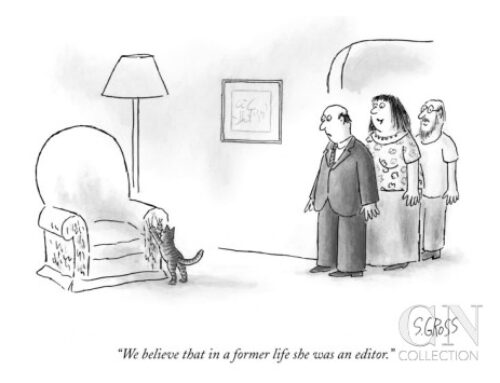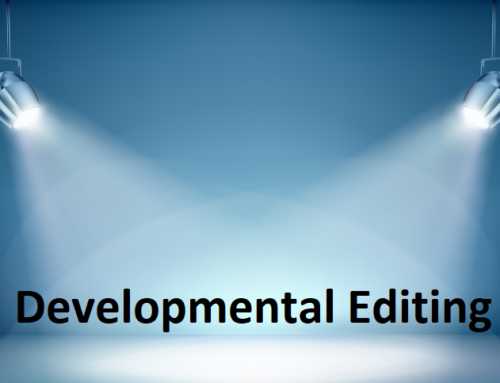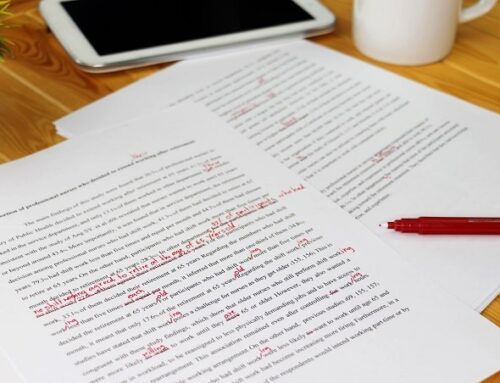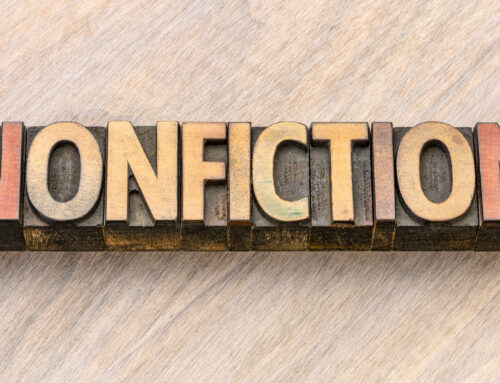This just in: your neighbor’s English skills are probably not up to the standards of book publishing.
When I first began editing books, I had been a professional editor for more than twenty years, at a New York-area newspaper, a regional magazine, and several magazines with an international readership. Perfectionist that I was at the time, I could quote the rules and principles of news writing and periodical publishing as if I had written them myself. I knew bits of esoteric information about word usage that less experienced, and less neurotic, editors wouldn’t even think to double-check.
The book-publishing arm of the magazine I worked for at the time offered me freelance work editing books. I expected a bit of a learning curve but not as steep a curve as I faced. Even though I had been a voracious reader throughout my life, I hadn’t thought much about pesky little nuisances like the structure of a story. I only knew that sometimes the books I read seemed disjointed, but I didn’t give much thought to why. I still had a lot to learn about editing.
It’s now been twenty years since I became a book editor. (Yes, the math is easy, even for an English major like me—I’ve been a professional editor for forty years, and during half of that time I’ve edited books.)
I have accumulated a staggering wealth of knowledge about book editing and publishing—because there’s a staggering amount to learn.
And despite my blasted tendency toward overachievement, I still don’t know it all.
So maybe you can understand why I bristle a bit when I’m with a group of fellow authors and one of them says,
“Oh, my neighbor is my editor. She’s good at English.”
I’m not a hunter or a gun-toting hiker, but I can assure you that at that moment, I am loaded for bear. Depending on the circumstances, though, I either politely smile and keep my mouth shut or subtly steer the conversation toward the editorial standards of the publishing industry. What I really want to do, and what I spend the rest of the night doing instead of sleeping, is ask these questions:
—Does your neighbor have any experience editing books? Oh really? How many?
—Does your neighbor even own a copy of the Chicago Manual of Style (the bible of the publishing industry) much less know how to use it? I didn’t think so.
—How much does your neighbor know about publishing and the ins and outs of editing books in specific genres? You don’t know? You may want to find out.
And that’s pretty much how the rest of my night goes, with me lying in bed, challenging imaginary authors everywhere who don’t see the need to hire a professional editor, asking them more questions than you’d like to hear.
If you’re wondering if you really need to hire a professional to edit your book, here’s something to consider:
Even though I have made my living as an editor for going on five decades, even though I have edited so many books that I stopped keeping track of them in the 1990s, even though I am as careful a writer as I can possibly be, I would never publish a book of my own without having it professionally edited. Each one of the thirty books I’ve written has been edited by a professional. And each one is better for it.
Look, I know how tight money can be. I know how tempting it must be to try to pare down the cost of getting a book published. And I can only imagine how easy it must be to convince yourself that your neighbor’s English skills are up to the standards of book publishing. But this is the bottom line for me: If I couldn’t afford to pay for both the print publishing and the editing, I would hire a professional editor and publish the book electronically instead. No question.
What is at stake is nothing less than your reputation as a writer.
Most of us have read Amazon reviewers who complain about everything from a novel’s loose ends to the horrifying number of typos, sometimes adding that they would never read a book by that author again. This is a critical factor to consider. If you want to have credibility as a writer, you have to produce quality work. Poorly edited books occasionally break out of the pack and rack up decent sales, but those instances are rare, and their authors seldom achieve subsequent success.
What’s more, you have to know what readers and publishers want. While it’s important for you to do some of that research yourself, an experienced professional editor has already done much of it and can steer your book in a way that will appeal to both readers and publishers alike. One of the areas I specialize in is religious publishing. If I hadn’t kept up on trends in that genre, I would be blissfully unaware of the tension between readers who want edgier content and publishers who have to produce books that Christian store owners are comfortable selling. In that genre, new authors in particular have to walk a fine line; without a professional editor, they likely won’t even know that a line exists.
Up to this point, I’ve used the word “editor” in a generic sense, but the work that editors do covers a significant range of services, from the nitty-gritty of proofreading and copy editing to the wide-angle scope of book development and book doctoring. A skilled editor can evaluate your manuscript and determine which service or services are needed to make your book the very best it can be, something that an acquaintance outside the industry likely can’t provide. After all, that’s what every conscientious agent, editor, and publisher wants for your manuscript—to transform it into a high-quality book that you and they can be proud of.
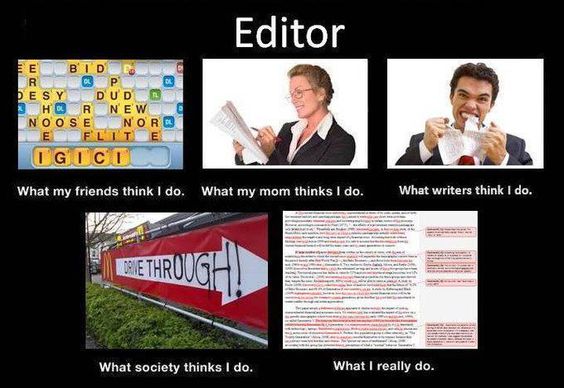 Professional editors are not spell-checkers on steroids. They are technicians and artists and master wordsmiths who are committed to helping you polish your manuscript and make it shine, all the while preserving your distinctive voice as an author. Asking a friend, relative, or neighbor to edit your book is seldom a wise move—that is, unless your friend, relative, or neighbor happens to be me or one of my colleagues in the publishing industry.
Professional editors are not spell-checkers on steroids. They are technicians and artists and master wordsmiths who are committed to helping you polish your manuscript and make it shine, all the while preserving your distinctive voice as an author. Asking a friend, relative, or neighbor to edit your book is seldom a wise move—that is, unless your friend, relative, or neighbor happens to be me or one of my colleagues in the publishing industry.


